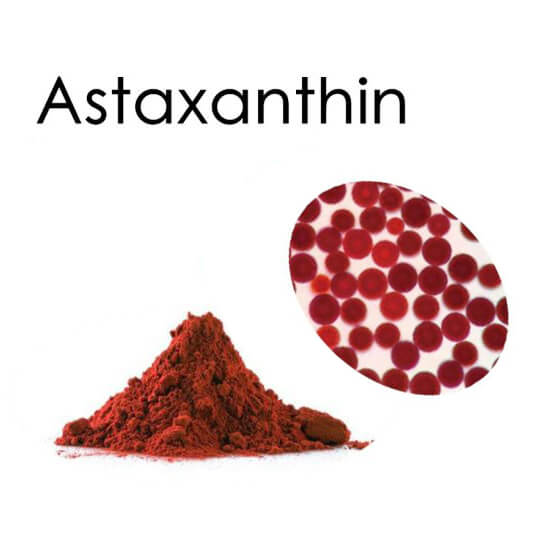Astaxanthin
Astaxanthin is a powerful antioxidant belonging to a group of natural pigments called xanthophylls. It belongs to a subcategory of the carotenoid family. Carotenoids are produced by both plants and animals and are antioxidants that are part of survival mechanisms.
read more...Astaxanthin is an antioxidant component that helps protect the body from the negative effects of free radicals. These toxins test the body's strength in several ways, as they are a by-product of many natural processes. For example, the breakdown of sugar for energy, the release of food enzymes, the breakdown of drugs. Also, the appearance of free radicals contributes to the unfavorable environmental situation.
Benefits of astaxanthin
Astaxanthin protects the skin from aging, gives it anti-aging properties, eliminates wrinkles. The substance is necessary to improve the elasticity of the dermis, the texture of the epidermis, the level of moisture. However, this is not the only useful advantage of the connection.
Let us list the rest:
- Protects the eyes relaxes the muscles of the eyeball, reduces fatigue.
- Reduces weight: Astaxanthin capsules help to increase metabolic activity in the body, reduce body fat, and accelerate lipolysis.
- Acts as a hepatoprotector: it is a powerful antioxidant carotenoid that accumulates in the liver, supporting its health and contributing to the restoration of the structure.
- Improves joint mobility: drugs containing an important substance relieve pain and inflammation.
- Eliminates violations of the organs of the reproductive sphere-supports the fertility of men at a high level, gives promising results at conception when the quality of sperm is not perfect.
Early studies have shown that Astaxanthin has a positive effect on triglyceride levels, which helps to maintain the balance of beneficial cholesterol in the body.
In its natural environment, the compound is found in crayfish, krill, crabs, lobsters, shrimps, seaweed, and rainbow trout. The prices of these foods are quite high, and the content of useful substances in them is small. By choosing Astaxanthin at an affordable price in the form of a supplement, you will save significantly.
Marine animals such as lobster, crab, and salmon have their color due to their diet from krill and other small organisms that feed on plankton and algae rich in astaxanthin. Astaxanthin, used as additives, is usually obtained from the algae called Haematococcus Pluvialis. These algae produce this antioxidant as a protective mechanism to protect against harmful UV rays.
Astaxanthin has been proven to be one of the most powerful antioxidant nutrients. It is much more effective than vitamins C or E, beta-carotene, lutein, or pycnogenol. That's why it's often called a super-antioxidant.
In laboratory studies, astaxanthin has been shown to have impressive antioxidant properties compared to some of the more well-known nutrients and herbs. Astaxanthin can be:
- 6000 times more powerful than vitamin C.
- 800 times more powerful than CoQ10.
- 500 times more powerful than green tea.
- 75 times more powerful than alpha-lipoic acid.
Effect of astaxanthin
- It crosses the blood-brain barrier to protect the nervous system.

- It has the ability to cross the blood-retinal barrier that protects the eyes.
- It is able to strengthen every cell, offering its remarkable antioxidant properties.
- In addition, it protects every part of your body, including organs, joints, and skin.
In addition, most antioxidants neutralize free radicals by sacrificing electrons from their molecules, making them subsequently ineffective. Astaxanthin, on the other hand, has a huge number of electrons, which means that it can remain active for longer periods of time.
Carotenoids, like many other compounds, are water-soluble or oil soluble. The unique feature of astaxanthin is the fact it can interact with both oil and water, which means that it not only circulates in the bloodstream but the molecule can attach to a cell membrane made up of an oil structure, meaning that it can neutralize free radicals in all parts of the body.
Astaxanthin also has powerful anti-inflammatory properties, and since inflammation is one of the leading causes of aging, this nutrient helps protect the body from aging.
Effects of astaxanthin on the human body
Since astaxanthin quenches inflammation and dissolves in every part of our body, it is easy to understand that it provides many benefits to the body.
Some of its advantages include:
- Cardiovascular protection: numerous studies show that astaxanthin helps to protect the heart, and its mode of action appears to reduce C-reactive protein. This protein is a marker of inflammation in the body, and lower levels are associated with a reduced risk of heart disease and other diseases. In addition, astaxanthin appears to integrate with the mitochondrial membranes of heart muscle cells, helping to protect them.
- Protection of the nervous system: several studies point to astaxanthin's ability to protect nerve cells and therefore slow down cognitive decline and other nerve-related diseases. This makes astaxanthin very useful for preventing loss of brain function.
- Eye health: We know that eating foods rich in carotenoids can be beneficial for protecting vision. The most prominent carotenoids for eyes are lutein and zeaxanthin, which are often recommended to prevent age-related macular degeneration. However, astaxanthin is in a different league when comparing its antioxidant properties with other carotenoids. Research shows that astaxanthin prevents damage to most eye tissues and structures and may be useful in preventing age-related eye problems such as retinopathy, glaucoma, and neuropathy.
- Skin health: Astaxanthin has demonstrated health benefits for the skin, helping to protect it from UV radiation, improving elasticity, firmness, and eliminating wrinkles. Astaxanthin has been shown to prevent UV damage to cells. Even more interesting is that it does not block UVB rays. These are rays that help in the production of vitamin D from the sun.
- Astaxanthin has been found valuable for preventing many other problems, including maintaining the immune system, protecting gum health, and improving reproductive health.







